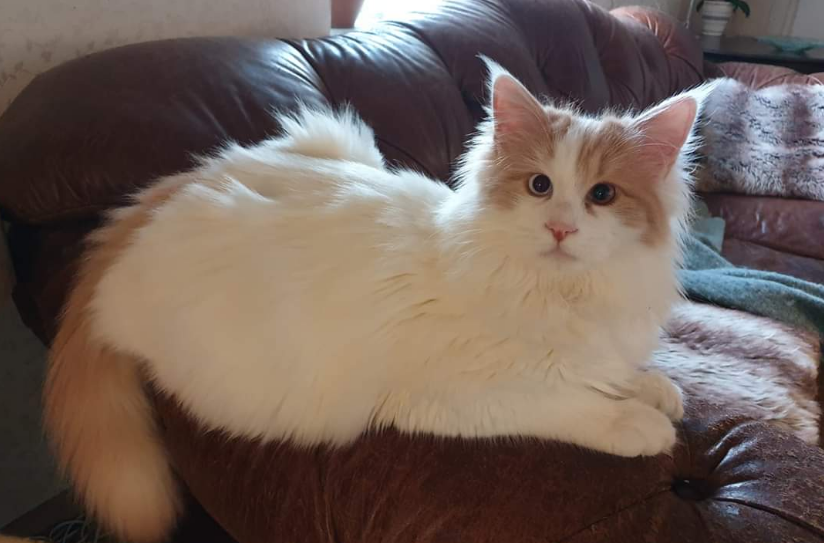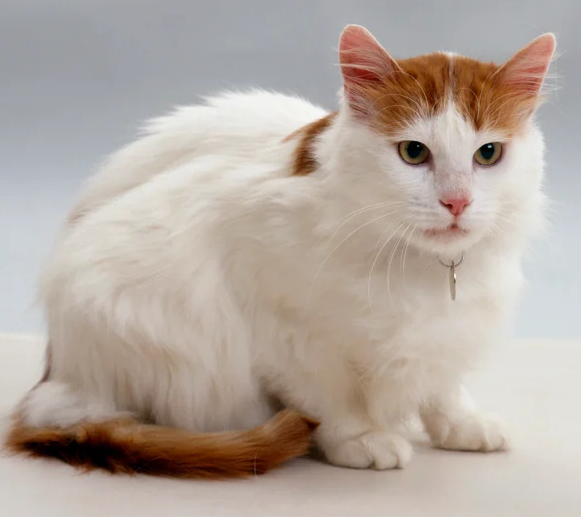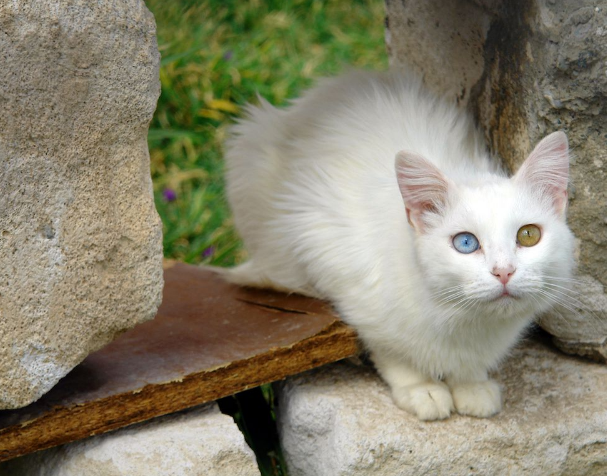Beautiful kittens with cashmere-soft fur, Turkish Van cat are well-known for their playful personalities and quirky behavior.
You should have plans in place to keep your Turkish Van cat entertained if you are considering bringing one into your home. They are not good if left alone for too long. However, these cats can bond with dogs and other felines.
Although Turkish Van cats are very friendly when children behave properly, they have their boundaries. They are more interested in active, playful interactions than holding or cuddling.
Also, Check Here
- o’reilly employee pay stub
- www.feels good to be heard.com
- now.gg snapchat login
- wilmington health patient portal
- www.beefeatervisit.co.uk
Turkish Van Cat Overview
| Temperament | Active, affectionate, personable, playful |
| Origin | Turkey |
| Other Names | The Swimming Cat |
| Group | Large long-haired |
| Height | 9″- 11″ |
| Body Length | 14″-17″ |
| Weight | 7-20 pounds |
| Life Expectancy | 12-17 years |
| Price | $800 – $1500 |
What Are the Initial Costs of Owning a Turkish Van?
Because of the rarity of this breed, it is difficult to find a kitten. In fact, there are only a few catteries in North America.
Breeders who keep Turkish Vans on their farms won’t release kittens or sell them without conducting a thorough background check of potential buyers.
They may even refuse to sell kittens if they don’t meet the requirements.
The Turkish Van Cat’s price range is from $400 to $1,100. You can find a variety of Turkish Vans on the Oodle Marketplace.
These range from purebreds to mixed breeds. Make sure to read all descriptions to ensure you fully understand what you are buying.
If the worst happens, you have one last option: find breeders abroad and arrange for shipping once your cat is old enough to travel.
Shipping costs will be borne by the buyer, so this option is more expensive.
News Now classifieds list purebred Turkish Vans for sale in the UK at £100 to £600, or around $129 to $774.
You can also buy Turkish Vans that have been crossbred with other breeds within this range, with the most expensive being at around £650 (or $838).
Turkish Van Buying Guide
It can be difficult to find a good Turkish Van breeder in the United States. How do you know if your cattery is a good one? What are the indicators or red flags you should be looking out for?
This checklist covers the most important traits you should look for in a responsible breeder. It also includes tips on how to make the best buying decision.
- In case of emergency, they should offer a minimum one-year health guarantee
- Make sure you check the living space and make sure the cats don’t live in cages. They won’t like living in cramped spaces.
- Kittens must be registered with the ACFA, TICA, or CFA.
- If a litter is not available when you call, don’t be surprised if potential buyers are asked to wait. Turkish Vans have only a few litters per year.
- Be aware that a breeder may be selling kittens at a lower price. This could indicate that he is trying to minimize costs by giving the kitten less care.
- Do not buy the “runt of the litter” just because you feel sorry about it
- You should inspect your purchase for ticks, fleas, and other parasites. If you find any, please notify the breeder immediately.
Things to Know When Owning a Turkish Van
Food & Diet Requirements
The Turkish Van doesn’t require any special diet. They are a natural cat breed but don’t need To be fed raw food.
This breed is a great choice for high-quality commercial cat food.
This breed would live in the wild off mice and other prey animals. It is best to give them commercial cat food, which is primarily made from animal products.
It doesn’t really matter what Type of meat you choose unless Your cat is allergic To it, such as chicken.
Exercise
These cats are often described as being very active by their owners. This is understandable, given that They were wild-bred. After all, wild cats are more active than domestic cats.
The Turkish Van, unlike other breeds, isn’t content To stay at home all day. They require regular physical activity, or they’ll hang from your curtains.
Training
The Turkish Van is smart and people-oriented.They Aare easy to train because of these traits.They are one of the easiest cats to train.
It is easy To teach your cat how to walk on a lead and what commands they should be using.
Some dogs may be able to outperform this cat breed.
They are so good.
Grooming
The Turkish Van is a unique breed. They are technically both short-haired. It all depends on what you ask.
Their winter coats are thick and long. They lose a lot of their fur in the summer and Have shorter hair lengths. This is A rare breed of cat but most cats shed some fur In The spring To prepare for warmer months.
Health and Conditions
The Turkish Van is almost entirely free of genetic problems. Because they were born wild and not through any human-led breeding, they are extremely healthy cats.
They are not deaf Like other Turkish cats. There is currently no scientific evidence to support the claim That these cats are more likely than other cats to go deaf.
The Breed Standard
BODY
Turkish Van cats should look balanced and well-built. They should have strong, muscular, sturdy, deep-chested, and broad bodies. Males are more delicate than females.
HEAD
The head should have a wide wedge shape with gentle contours. The muzzle should be round, the chin should not be too firm and the cheekbones prominent.
EARS
Turkish Van cats should have medium-sized ears. They should be placed high on the head and spaced well apart. The interior should be well-furnished and the tips should be slightly rounded.
COAT
The coat should be semi-long and have no undercoat. The summer coat is shorter and denser than the winter coat. Some people may seem almost short-haired in the summer months.
COLOR
Turkish Van cats must be white with symmetrical, or almost symmetrical, colour patches on their heads and tails.
Up to 15% of the body may be covered by random markings. All Turkish Vans should have pink-nose leather. Paw pads should also be pink.
EYES
Eyes should be medium-large, round, and set at an angle. You can accept blue, amber, and other eye colours.
LEGS & PAWS
Legs should be medium-long with strong muscles. The feet should be medium-sized and proportioned to the rest.
TAIL
Turkish Van cats should have a long, well-proportioned, and flowing tail that blends well with the rest of their coat.
Turkish Van Kitten Names
| Rank | Male | Female |
| 01 | Chloe | Angel |
| 02 | Oliver | Princess |
| 03 | Tigger | Molly |
| 04 | Coco | Tippy |
| 05 | Tommy | Lily |
| 06 | Gavin | Alice |
| 07 | Chunk | Sophie |
| 08 | Gracie | Kitkat |
| 09 | Diesel | Chloe |
| 10 | Olley | Sasha |
Turkish Van Cat Personality
-
Active: Turkish Van cats are highly active and energetic cats, always on the move and looking for something to do.
-
Intelligent: These cats are highly intelligent and can easily learn tricks and commands. They also enjoy puzzles and games that challenge their mind.
-
Playful: Turkish Van cats are known for their playful nature.
-
Affectionate: Despite their energetic nature, Turkish Van cats are also known for their love and affection towards their owners.
-
Curious: These cats are naturally curious and enjoy exploring their environment. They will often follow their owners around the house and investigate anything that catches their attention.
-
Independent: Although affectionate, Turkish Van cats are also independent and like to have their own space.
-
Vocal: Turkish Van cats are quite vocal and will often meow or chirp to communicate with their owners. They may also purr loudly when content.
-
Confident: These cats are confident in their abilities and will often take on challenges with ease.
-
Water-loving: One of the most unique personality traits of Turkish Van cats is their love for the water. They enjoy playing in the water and may even swim if given the opportunity.
-
Protective: Turkish Van cats are protective of their family and home. They will often alert their owners to potential dangers and may even defend their homes if they feel threatened.
-
Social: These cats enjoy being around people and other pets. They are not typically shy or aloof and will often seek attention from their human companions.
-
Agile: Turkish Van cats are known for their agility and athleticism. They are quick and nimble and enjoy jumping and climbing.
-
Talkative: These cats are known for their chatty nature. They will often vocalize their thoughts and feelings and can be quite vocal when they want attention.
How Do I Know If My Cat Is A Turkish Van
Turkish Van cats have a distinct appearance with a mostly white body and colored markings on the head and tail.
However, to know for sure if your cat is a Turkish Van, you would need to have documentation from a breeder or a DNA test.
Turkish Van cats are also known for their love of water, so if your cat enjoys playing or swimming in the water, it could be a sign that they have Turkish Van ancestry.
Additionally, they are active, curious, and social cats, so if your cat exhibits these traits, it could also be an indicator of Turkish Van heritage.
Turkish Van Cat Black And White
The Turkish Van cat breed is most commonly known for its distinctive pattern of white fur with colored markings on the head and tail.
However, it is possible for Turkish Van cats to have black and white coloring as well. This is due to a genetic mutation that can result in solid black patches or spots on the white fur.
While the black and white coloring may not be as common for the breed, it does not affect their personality or Turkish van characteristics.
Turkish Van Cat Health Problems
Turkish Van cats are usually healthy, with just a few breed-specific health issues.
Hypertrophic Cardiomyopathy (HCM), a hereditary cardiac ailment that can lead to heart failure, is one of the more frequent health issues among Turkish Van cats. Breeders must test their cats for HCM, and owners must take their cats to the doctor on a regular basis for examinations.
Furthermore, Turkish Van cats may be prone to allergies, particularly food allergies. Owners should keep an eye on their cats for signs including scratching, skin irritation, and digestive issues, and consult with their veterinarian to discover the reason and proper therapy.
Regular medical checks, a good diet, and lots of exercises, like with other cats, may help preserve a Turkish Van cat’s general health and avoid future health concerns.
Final Thoughts
The Turkish Van Is a rare breed of van That originated in Turkey. Unlike other kinds, they evolved organically in the wild. They are practical cats, Therefore They are often very well-suited for this purpose.
They Can Be very people-oriented and are naturally sociable.
The Turkish van is a versatile vehicle That may fit In many different types of dwellings.
As long as They are socialized at a young age, Turkish Vans can get along with dogs and children.
The Turkish Van is extremely healthy due To Their past.
We know that they aren’t susceptible To any genetic conditions.
They Are rare so It is possible that we Haven’t yet discovered their predispositions.
For more details visit the commercialvehicleinfo.com
Turkish Van Cat Frequently Asked Questions
If you are looking for a Turkish Van cat for sale, there are several options available:
1. Adoption: You can search for adoptable Turkish Van cats from shelters and rescues in Chewy’s network. You can also check Adopt-a-Pet and Petfinder to find adoptable Turkish Van cats in your area.
2. Breeders: If you prefer to buy a Turkish Van from a breeder, you can check out YpsiVans Turkish Van Cattery or search for breeders on Breedlist.com.
3. Online Listings: You can also find Turkish Van kittens for sale or adoption on websites such as GoKitty.com.
The Turkish Van cat is a rare breed, with only about 100 born in the United States per year. These cats are among the rarest breeds.
Turkish Van cats are medium to large in size, with females weighing seven to 12 pounds and males weighing 10 to 20 pounds. They typically range between 9″-11″ in overall height (23-28 cm) and 14″-17″ (36-43 cm) in body length.
Turkish Van Cat Breed Information | Hill’s Pet
The Turkish Van has unusual markings, called a “Van pattern,” which consists of a nearly all-white body with coloring on her face and tail.
Costs For Turkish Van cats range from $800 to $1500.
Turkish vans live 12 to 17 Years on average.
Turkish Van cats Can shed a lot And Have lengthy Hair.
A Turkish Van Cat is a rare and ancient breed of domestic cat that originated in Turkey. They are known for their unique coat pattern, which is mostly white with colored markings on their head and tail.
A medium-sized breed, Turkish Van cats normally weigh between 7 and 12 pounds for females and 10 to 20 pounds for males.
No, Turkish Van Cats are not hypoallergenic. While they may shed less than some other breeds, they still produce dander and can cause allergic reactions in some people.
Turkish Van Cats are known for their friendly and sociable nature, and can often get along well with dogs. However, proper introductions and supervision are always recommended.
The cost of a Turkish Van Cat can vary depending on several factors, such as age, gender, and pedigree. On average, you can expect to pay anywhere from $500-$1500 for a Turkish Van kitten.
Turkish Van Cats live an average of 12–17 years, which is quite lengthy compared to other cat breeds.


